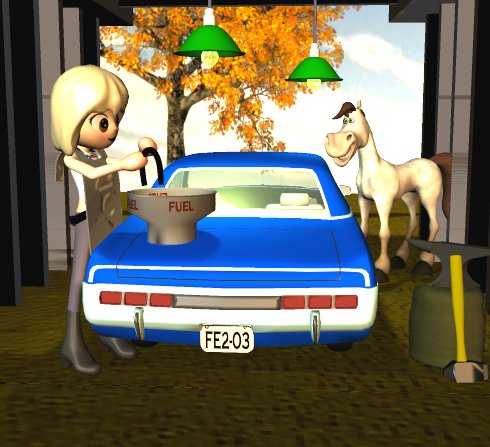Saturday, October 22, 2005
Alternative transportation, 2009 style?

This is just plain exciting. What's more, the research is not being done in Japan or China, but in Tennessee, and it's not even being done by temporary Chinesespies visitors, unlike 99% of the research that passes for "American"!
Anyone who knows a bit about chemistry knows that iron is combustible. So why not burn it as a fuel? Or aluminum, boron, or other metallic elements? There's no theoretical reason why not, but until now there were huge practical barriers.
At Oak Ridge Labs, Dave Beach is working to perfect a technique using extremely fine iron particles, which can be burned in a gas turbine or even an internal combustion engine. Ideally, iron should give twice as much energy per unit of volume as gasoline; aluminum should give about the same energy per unit of weight.
The critical advantage of 'nanoparticles' is that they burn at 250 C, which is easily handled by ordinary engines; also, they don't vaporize or melt, but simply become same-sized particles of rust. So they can be sucked in and blown out pretty much the same way as carbureted liquid fuel, without melted stuff glomping up the cylinder walls, and with absolutely no emission. Oxygen in, energy out.
The used particles can be scrubbed by a magnet and stored. Filling up would entail exchanging the can of rusty particles for a fresh can of pure metal. There are a number of engineering problems, but the advantages are so great that the engineering is worth the trouble.
Gives a whole new meaning to rustbucket, eh?
-----
Edit for completeness: The ultimate goal of this setup is not to use up all the scrap iron and then be finished. The goal is a recharging system that gives high performance and no emissions. Even after 100 years of development, electric batteries aren't up to the task, and other chemical fuel cell ideas use rare or dangerous components and still emit by-products. For instance, a hydrogen cell throws out lots of water vapor, which could shroud a city in perpetual dense fog. Might not be as smelly as gasoline pollution, but far more dangerous.
With the iron system, you'd trade an oxidized tank for a fresh one, and the recharger or "refinery" would take out the oxygen.
More here.

This is just plain exciting. What's more, the research is not being done in Japan or China, but in Tennessee, and it's not even being done by temporary Chinese
Anyone who knows a bit about chemistry knows that iron is combustible. So why not burn it as a fuel? Or aluminum, boron, or other metallic elements? There's no theoretical reason why not, but until now there were huge practical barriers.
At Oak Ridge Labs, Dave Beach is working to perfect a technique using extremely fine iron particles, which can be burned in a gas turbine or even an internal combustion engine. Ideally, iron should give twice as much energy per unit of volume as gasoline; aluminum should give about the same energy per unit of weight.
The critical advantage of 'nanoparticles' is that they burn at 250 C, which is easily handled by ordinary engines; also, they don't vaporize or melt, but simply become same-sized particles of rust. So they can be sucked in and blown out pretty much the same way as carbureted liquid fuel, without melted stuff glomping up the cylinder walls, and with absolutely no emission. Oxygen in, energy out.
The used particles can be scrubbed by a magnet and stored. Filling up would entail exchanging the can of rusty particles for a fresh can of pure metal. There are a number of engineering problems, but the advantages are so great that the engineering is worth the trouble.
Gives a whole new meaning to rustbucket, eh?
-----
Edit for completeness: The ultimate goal of this setup is not to use up all the scrap iron and then be finished. The goal is a recharging system that gives high performance and no emissions. Even after 100 years of development, electric batteries aren't up to the task, and other chemical fuel cell ideas use rare or dangerous components and still emit by-products. For instance, a hydrogen cell throws out lots of water vapor, which could shroud a city in perpetual dense fog. Might not be as smelly as gasoline pollution, but far more dangerous.
With the iron system, you'd trade an oxidized tank for a fresh one, and the recharger or "refinery" would take out the oxygen.
More here.
